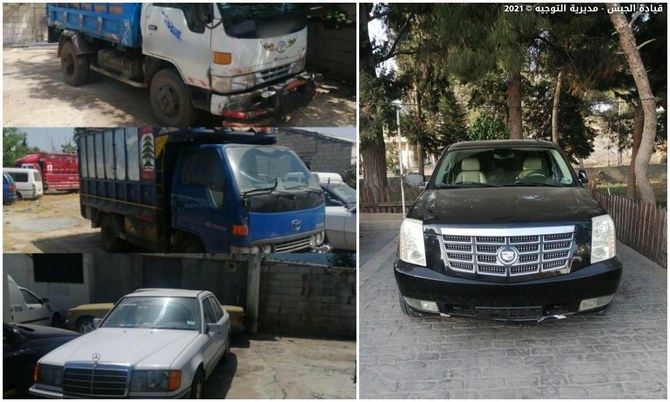
by AFP -- BEIRUT — Lebanon's central bank on Sunday announced a "conditional" plan that would allow depositors, hit by strangling financial restrictions, to access part of their foreign currency savings stuck in Lebanese banks. Lebanon is in the grips of its worst economic crisis since the 1975-1990 civil war, and more than half of the population is now in poverty. The Lebanese pound, officially pegged to the dollar at 1,507 since 1997, has lost more than 85 per cent of its value against the greenback on the black market. Since Autumn 2019, banks have largely prevented ordinary depositors from accessing their dollar savings or transferring them abroad, forcing them to resort to the black market to obtain foreign currency.
Holders of dollar accounts have only been able to access their money by exchanging it into the local currency at a rate of 3,900 to the greenback. The dollar is currently trading for more than 12,500 pounds on the black market. The central bank said on Sunday it was negotiating "a mechanism [with Lebanese lenders]under which the banks would begin to gradually give [clients] access to their deposits... in all currencies". The institution is mulling a plan that would involve banks "paying [savers] sums of up to $25,000 in US dollars or any [other] foreign currency along with its equivalent in Lebanese pounds", the statement added. It did not specify the exchange rate for amounts converted to the local currency.

by justice.gov -- ALEXANDRIA, Va. – A dual Lebanese and U.S. citizen who resides in Vienna, Virginia pleaded guilty today to participating in a conspiracy to launder money as part of a decade-long scheme to ship electronics equipment to a Hizballah-owned television station in Lebanon. In addition, the defendant and her husband pleaded guilty to conspiring to commit tax fraud by concealing income from her employment in Virginia. “For over a decade, Racha Farhat participated in a conspiracy to purchase electronics equipment using the proceeds of illegal activity, which benefited a Lebanese television station owned by Hizballah,” said Raj Parekh, Acting U.S. Attorney for the Eastern District of Virginia. “Working with our law enforcement partners, we will bring to justice those who use the U.S. financial system to further the interests of prohibited entities that engage in unlawful activities abroad.”
According to court documents, Racha Farhat, 44, began laundering money in 2010 and continued to do so until the time of her arrest in February 2021. The scheme involved Farhat receiving money from an unindicted co-conspirator (UCC-1) in Lebanon, which she used to purchase electronics equipment in the United States. Farhat then shipped the items purchased by herself and other co-conspirators overseas, primarily to Lebanon, where UCC-1 supplied at least $175,000 worth of goods to Al Manar TV. Al Manar TV is a Lebanon-based TV station owned and operated by Hizballah. Both Hizballah and Al Manar TV are prohibited entities for a U.S. person to conduct business with under the International Emergency Economic Powers Act (IEEPA).
![Mavia's bakers prepare dough for the next batch of bread [Maghie Ghali/Al Jazeera]](https://www.aljazeera.com/wp-content/uploads/2021/05/Mavias-bakers-prepare-dough-for-the-next-batch-of-bread.-Photo-by-Maghie-Ghali.jpg?resize=770%2C513)
By Maghie Ghali - aljazeera.com -- - Beirut, Lebanon – As the deepening economic crisis continues, the soaring prices of basic necessities like bread have pushed many Lebanese below the poverty line. With Lebanon’s bakers relying on imported wheat to produce their goods, the cost of even the heavily subsidised traditional flatbread – eaten by rich and poor alike with most meals – has tripled since 2019. Mavia Bakery, a small outfit tucked away in Beirut’s Gemmayzeh district, is trying to ensure Lebanon has better food security and is less dependent on imported flour for its bakeries with a series of humanitarian projects. Opened in 2020 by educational NGO Sadalsuud founder and avid baker Brant Stewart, the bakery works out of a cooperative kitchen in Tripoli and only hires women from marginalised communities. “This space came about because I wanted to do something that is desirable and needed regardless of who makes it, otherwise it’s not sustainable,” Stewart told Al Jazeera. “The number of people willing to buy something because of who made it dries up quickly – there are only so many beaded bags that people can buy, but everyone needs bread.”
Locally grown
Currently, 80 percent of the wheat Lebanon consumes is imported from countries like Ukraine, which has high production on vast tracts of land Lebanon lacks. What little local wheat is grown is used as freekeh or burghul (bulgur). “Wheat as a commodity crop is not financially viable in Lebanon. There are people who grow their own wheat for personal use but, on an industrial scale, local wheat doesn’t happen,” Stewart said. “The flour that we buy here from the Bakalian mill, which is made from imported wheat, costs 1,500 lira per kilo [$1], which is much cheaper than the local Bekaa wheat that we buy, which is for 5,000 lira [$3.30] a kilo because there is not enough being grown to cover demand. “There hasn’t been a mill focused on milling locally grown wheat either – these massive mills working imported wheat can’t just take a small amount of local stuff and mill it,” he added. “These machines are huge and it really is the milling that is the missing link in the chain. Milling is an art and the milling that’s happening on a smaller scale is not milled well and is low quality.”

by arabnews.com -- BEIRUT: Lebanese security forces have foiled a bid to smuggle 8,000 liters of fuel into Syria. The Internal Security Forces (ISF) arrested a four-member gang of Lebanese smugglers, who had stashed the subsidized fuel in two secret tanks that were hidden inside pick-up trucks. ISF said an informant had tipped off intelligence and information teams about the smugglers’ intent to conceal the fuel and smuggle it through one of the Akkar-Hermel routes to Syria. An ISF squad stopped and impounded three vehicles in a sting operation at Bayno-Al Oyoun highway, leading to Hermel, on Thursday.
The three impounded cars were the pick-up trucks and a white Mercedes, which was used to monitor the route. “Unfortunately, while law enforcement bodies are working vigilantly to curtail smuggling of subsidized products by smugglers to Syria, many of those are covered up by politicians or influential figures,” an unnamed senior lieutenant said. “Smuggling subsidized goods (mainly petrol and diesel) has prospered recently, especially with smugglers purchasing fuel products here for around LBP40,000 ($26.53) per tank and selling them in Syria for three or four times that price.”
Khazen History


Historical Feature:
Churches and Monasteries of the Khazen family

St. Anthony of Padua Church in Ballouneh
Mar Abda Church in Bakaatit Kanaan
Saint Michael Church in Bkaatouta
Saint Therese Church in Qolayaat
Saint Simeon Stylites (مار سمعان العامودي) Church In Ajaltoun
Virgin Mary Church (سيدة المعونات) in Sheilé
Assumption of Mary Church in Ballouneh
1 - The sword of the Maronite Prince
2 - LES KHAZEN CONSULS DE FRANCE
3 - LES MARONITES & LES KHAZEN
4 - LES MAAN & LES KHAZEN
5 - ORIGINE DE LA FAMILLE
Population Movements to Keserwan - The Khazens and The Maans
ما جاء عن الثورة في المقاطعة الكسروانية
ثورة أهالي كسروان على المشايخ الخوازنة وأسبابها
Origins of the "Prince of Maronite" Title
Growing diversity: the Khazin sheiks and the clergy in the first decades of the 18th century
Historical Members:
Barbar Beik El Khazen [English]
Patriach Toubia Kaiss El Khazen(Biography & Life Part1 Part2) (Arabic)
Patriach Youssef Dargham El Khazen (Cont'd)
Cheikh Bishara Jafal El Khazen
Patriarch Youssef Raji El Khazen
The Martyrs Cheikh Philippe & Cheikh Farid El Khazen
Cheikh Nawfal El Khazen (Consul De France)
Cheikh Hossun El Khazen (Consul De France)
Cheikh Abou-Nawfal El Khazen (Consul De France)
Cheikh Francis Abee Nader & his son Yousef
Cheikh Abou-Kanso El Khazen (Consul De France)
Cheikh Abou Nader El Khazen
Cheikh Chafic El Khazen
Cheikh Keserwan El Khazen
Cheikh Serhal El Khazen [English]
Cheikh Rafiq El Khazen [English]
Cheikh Hanna El Khazen
Cheikha Arzi El Khazen
Marie El Khazen